Trotskyism
- www.workers.org Stop the war on Iran before it starts!
As of Aug. 8, the Pentagon has deployed 3,000 Marines and sailors to the seas near Iran, some on civilian vessels. Three weeks earlier, the U.S. “Secretary of Defense” Lloyd Austin, sent “the destroyer USS Thomas Hudner, F-35 fighters and F-16 fighters to the U.S. Central Command area of responsibil

>There is a simple way to prevent conflict: Get rid of the sanctions! > >Instead, Biden and company have greeted the legitimate Iranian resistance by escalating the war danger. Sending sailors and Marines to this hot region puts these troops in danger, risking their lives to create a pretext for an attack on Iran — invented by the Pentagon propaganda machine, if necessary (remember the Gulf of Tonkin, August 1964). > >For anti-imperialists, for those of us in the movement who have absorbed the lessons first taught by the Russian revolutionary V.I. Lenin during World War I, there is no need to wait for a whistleblower like the late Daniel Ellsberg to know the class truth of these latest U.S. war moves against Iran. > >Pull the sailors and Marines out of the seas near Iran. End the economic sanctions against Iran. Stop the [neo]imperialist war before it starts!
-
Massively Increase Public Housing! Confiscate the Ultra-Rich’s Vacant Houses!
>Those opposing an emphasis on public housing and strict controls on the housing market argue that such an agenda does not work in practice. They say it is outdated and goes against the world trend of privatisation, “user-pays” and neo-liberal deregulation. > >There is a huge problem with that argument, however. In Australia’s largest trading partner, the People’s Republic of China (PRC), the direction over the last decade and a half has been explicitly towards public housing and strict regulation of the housing sector. > >In the decade from 2008, the PRC provided 70 million additional public housing dwellings for her low and lower-middle income people. Proportionate to population size, China delivered in ten years, one and a half times the amount of public housing as what the Greens promise to provide in low-cost accommodation over twenty years. > >As a result, today, the percentage of China’s urban population in public housing is nearly ten times higher than Australia’s. Moreover, the PRC’s public housing drive continues. Last year, the PRC provided an additional two and a half million public rental dwellings for her people. In percentage terms, this is equivalent to 45,000 dwellings here. > >That means proportionate to population size, Red China in just one year provided one and a half times as much public housing as what the Albanese government promises to deliver in privately-owned “social and affordable” housing over five years. > >And unlike here, China does not have a homelessness crisis. Despite China (which is still trying to pull herself up from her impoverished pre-1949, capitalist days) having a per capita income some three to five times lower than Australia’s, Chinese international students entering Australia, the U.S. and Western Europe are shocked at the level of homelessness in these richer countries compared with their socialistic homeland. > >The PRC’s public housing drive is part of Beijing’s official housing policy that is aptly titled; “Houses are for living, not for speculation.” The PRC takes the opposite stance towards housing speculation compared to successive Australian governments. For example, most Chinese cities ban households from buying more than two homes. > >Needless to say, Australia’s big end of town hate the PRC’s policies. That is why their media seek to denigrate it at every possible instance. Last year, they seized on the troubles of a Chinese capitalist developer hit by the anti-speculation campaign to claim that the PRC’s “Houses are for living, not for speculation”-policy was soon going to cause the Chinese economy to collapse. Needless to say, that never happened! > >Today, while the capitalist Australian, American, British and German economies are either in recession or on the verge of one, the PRC’s economy surged by 4.5% last quarter. More importantly, socialistic China’s workers continue to enjoy, by far, the world’s fastest growth rate in real wages. > >All this is why the Western capitalist powers see China as an “existential threat.” They fear that the successes of China’[s] socialist alternative will encourage their own masses to also demand a system that puts the masses’ needs above big end of town profits. Frankly, that is the kind of “threat” that working class people in the capitalist West need! > >Let’s help “infect” Australia’s working class population with sympathy for Red China’s “Houses are for living, not for speculation” policy and her system that underpins it. > >The fact that China’s transition to socialism is incomplete, bureaucratically distorted and endangered by hostile elements — including by the capitalist powers internationally and by its own capitalists who long to have the right to “freely” exploit as in “normal” (that is capitalist) countries and who have a layer of academics, lawyers, journalists and politicians in the right wing of the ruling Communist Party of China doing their bidding — actually makes socialistic rule in China more in need of defence, not less. > >Let’s oppose the U.S. and Australian régime’s military build up against the PRC! Let’s refute their lying propaganda attacks against China! And let’s oppose the anticommunist groups within China that they support in their quest to destroy socialistic rule there!
(Emphasis original.)
-
Defend the People’s Republic of China against the AUKUS Régimes’ Political & Military War Drive!
>With China’s socialistic state-owned enterprises offering developing countries access to infrastructure development, capital and technology without ripping them off, these countries are giving some projects to China that they would previously have had to give to Australia’s plundering corporate bigwigs. Moreover, with China’s public sector firms offering such good deals, South Pacific and southeast Asian countries are using the “threat” of turning to China to claw better terms from Australian companies that continue to be granted projects. Either way, without actually meaning to do so, the PRC’s socialistic enterprises’ mutually beneficial cooperation with countries in this region is causing Australia’s capitalists to lose money – lose big money! And we know how greedy capitalists behave when their profits are threatened!
(Emphasis original.)
- www.workers.org Methadone clinics: ending stigma and social control
In the 1930s, the German company I.G. Farben was looking for a solution to the opium shortage and the company’s inability to create new painkillers. The company found the solution in a chemical then-called Dolophine. Now called methadone (Methadose, Diskets), an urban legend circulated that D
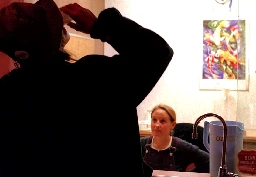
>The methadone-clinic system should be abolished completely. Patients should be able to get their treatment from their primary care physicians, rather than vaguely named “addiction specialists.” But until this happens, how can the prescription of methadone be liberalized for patients who need it?
-
Reverse the Plunge in Working Class People’s Living Standards!
>Whenever workers demand improvements in their wages, the capitalists scream that this will cause job losses. But such job cuts will only occur if we let these exploiters carry out retrenchments and if we let them retain as few workers as is necessary to maximise their profits. Instead of doing that, we must force the capitalist bosses to hire more workers than they want to at the expense of their profits. We must demand a ban on job cuts by all profitable firms and must demand that all companies making a profit be required to increase their number of full-time, permanent employees by at least twenty-five workers for every one million dollars of quarterly profit.
(Emphasis original.)
- www.workers.org Young workers show the way forward as economic crisis deepens
A global economic crisis is emerging, and for readers of Workers World, this comes as little to no surprise. As Marxists and dialectical materialists, we are cautious about making predictions. It is no secret that corporations are bragging about record profits at the same time working people ...
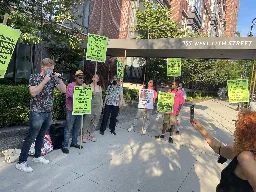
>The capitalist class’s current “solution” to the very inflation and staffing crisis their profit-driven system created is to raise interest rates. In mid-June the Federal Open Market Committee raised its key interest rate by 75 basis points, which is its largest rate increase since November 1994. (Forbes Advisor, June 15) The “logic” behind boosting interest rates is based on a deceptive prediction that people will spend less, and that should somehow reduce inflation. > >Working and oppressed people, particularly the youth, are the ones expected to suffer most because of higher interest rates, which will impact mortgages and student loans. According to freelance writer and business analyst Mary Hall, “. . . as interest rates rise, many investors believe growth stocks [will] come to appear less favorable, because their long-term discounted cash flow is reduced and their ability to [secure] low-cost debt financing is more difficult.” (Investopedia June 22) > >The fluctuation of interest rates by the Fed is a game that has historically been played by the billionaire class at the expense of the working class and nationally oppressed people.
- www.workers.org No sanctions, no nukes, no war!
A seismic shift is sending shock waves through the global economy. The well-established capitalist disorder, dominated by U.S. imperialism and in place since World War II, is on shaky ground. Extreme economic sanctions imposed on Russia are dragging the whole world into a war that started lon...
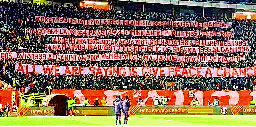
>A big calculation is which countries will be forced to accept the onerous economic sanctions imposed on Russia by the U.S. Countries representing a majority of the world’s population are not willing to tie their sovereignty to total Wall Street control. To the shock of U.S. war strategists, almost all of Latin America, the Caribbean, many countries in Africa, and most of Asia have rejected the sanctions on Russia. > >The open defiance by so many countries and major trading blocs is a stunning confirmation of the weakening hold of U.S. economic power.
-
Oppose Western Imperialism’s Provocative & Hypocritical Interference into the Ukraine Conflict!
>Regardless of how the conflict initially began, the war from the point of view of the Western [neo]imperialists would become one aimed at expanding the power and reach of NATO, deepening the economic subordination of Russia and sending a message to the world that anyone who dares defy Western imperialism will be mercilessly smashed. In that case, socialists must stand for the defence of Russia. However, the current conflict is not one of Western imperialism versus Russia. It is a war between Ukraine backed by the Western powers and Russia.
(Emphasis original.)
-
Comrades, esp. in the U.S., we need to seriously talk about what’s going on in the working class
www.workers.org Comrades, especially in the U.S., we need to seriously talk about what’s going on in the working classBy Larry Holmes “In the absence of organization, working people do not constitute a class but rather an incoherent mass, scattered over the whole country and broken up by their mutual competition.” — Karl Marx and Frederick Engels, The Communist Manifesto To all who consider thems...

>The level of worker activism has not yet reached the level of an irreversible, massive worker uprising. Still many, including this writer, see analogies between today and the beginning of the workers’ upsurge that brought tens of millions of industrial workers into the class struggle and into labor unions in the 1930s. > >Why the analogy? Something is happening, something that’s been long awaited and something that holds the potential of awakening the sleeping giant that is the U.S. working class — but also transforming its organizational and political character.
- www.workers.org Letters from our incarcerated family
Dear Workers World, I’m writing to you in hopes to start to receive this paper. I would like to understand more of what’s happening in other parts of the world, with protests, struggle, hopes — and good news in general would be great. I would like to thank you for your concern and kindness to a p
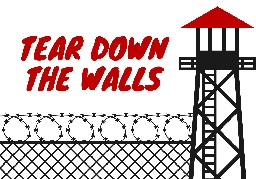
>I’m a victim of guard brutality. I was physically assaulted while at Frackville, by two guards while handcuffed. I’m still spitting up blood. I’ve lost over 30 pounds. Guards stole $285 of my commissary, my wedding band, and my legal work.
-
U.S.-NATO neoimperialism pushes Ukraine to the front line
www.workers.org U.S.-NATO imperialism pushes Ukraine to the front lineBy Manuel Raposo Raposo is the editor of the Portuguese Marxist web magazine jornalmudardevida.net and was a key organizer of the 2004 Portuguese session of the People’s Tribunal on the crimes of imperialism during the invasion and occupation of Iraq. Translation: John Catalinotto. March
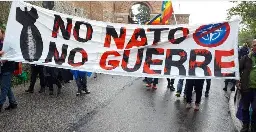
>To see in the Ukrainian conflict a struggle between two world views, between autocracy and democracy, between tyranny and freedom, is a mystification. What is being disputed is the space that the loss of hegemony by the imperialist West leaves to the new powers that yesterday were in the shadows and were therefore sidelined and that are now asserting themselves with the capacity to compete on the world stage. > >It is unclear what form the new order heralded by the conflict will take. But it is certain that it will reflect the irremediable change in the world balance of power. Those forces that align with the U.S. and EU camps — on the pretext that they represent “Democracy” and “Freedom” — are in fact once again capitulating to imperialism — and this time their surrender is no longer to a rising force, but to an old world that is sinking.
-
The war on Donbass: why we must all stand against neofascism
www.workers.org The war on Donbass: why we must all stand against fascismThis lightly edited opinion piece by journalist, author and activist Fra Hughes first appeared in the Arab independent media satellite Al Mayadeen, Feb. 26. The Donbass people, much like the Palestinian people, continued to resist the dominance of global capitalism that supports fascism in Ukrain
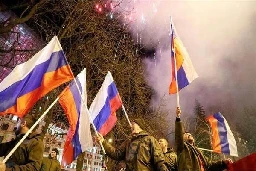
>For those who claim President [Vladimir] Putin is a megalomaniac sociopath, intent on drawing Europe and the U.S. into some kind of Machiavellian war in order to massage his overinflated ego, let’s look at the facts, shall we. > >Over the past eight years, Putin has avoided a conflict with Ukraine, and by extension the EU, United States and NATO, through his refusal to annex the Lugansk and Donetsk Republics or indeed to formally acknowledge them as independent states. > >He allowed the Minsk Agreements 1 and 2, from 2014 and 2015, to form the basis of negotiations between the Lugansk People’s Republic, the Donetsk People’s Republic and the regime in Ukraine; [and] for over seven years the regime in Ukraine, to include the infamous [neo]fascist, pro-neo-Nazi nationalist, Ukrainian armed forces Azov Battalion, to continually violate the Minsk Agreements by shelling the independent republics with prohibited military munitions, causing death and destruction. > >Zelensky being courted by the West took things further, when he escalated tensions and violence on the line of contact and prepared, in February, 120,000 Ukrainian soldiers to invade and reoccupy the Donbass region. > >He stated publicly he wanted Ukraine to become a nuclear power.
- www.workers.org U.S.-instigated conflict threatens humanity
Tens of thousands of essential workers lost their lives during the COVID-19 pandemic. Many were exposed when they were put in harm’s way to do the work providing the goods and services, so that corporate owners could continue to gather their billions of dollars in profits. The print press a...
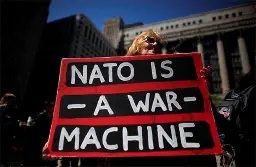
-
What the workers should know about NATO, Russia & Ukraine
www.workers.org Disband NATO – the U.S. war provocateur What the workers should know about NATO, Russia and UkraineWhat is NATO? NATO, the North Atlantic Treaty Organization, is strictly a military alliance, commanded and mostly equipped by the U.S.; it was founded in 1949, in the aftermath of WWII, when hundreds of thousands of U.S. troops occupied Western Europe. NATO’s purpose was to enforce capitalis
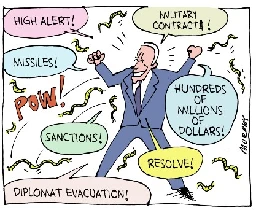
-
Workers World Commentary: Starbucks union drive reflects growing class consciousness
www.workers.org Starbucks union drive reflects growing class consciousnessThis is an edited talk given to a Workers World Party plenum Jan. 28 byArjae Red, a worker organizer with Starbucks Workers United in Buffalo, New York. Update Jan. 31: According to SB Workers United and More Perfect Union on twitter, 60 stores across 19 states have filed for a union election. In

>What is motivating many Starbucks workers to unionize is a fundamental belief that they should have a say in their workplace and the idea that a company doesn’t have to be as bad as Amazon or Walmart for the workers to deserve a union. Many stores that have filed for union representation have explicitly stated this in their letters to Starbucks CEO Kevin Johnson — that the decision to unionize is based on principle and not a specific list of hardships and grievances.
- www.workers.org Which side are you on? U.S.-EU vs. Russia-China
Raposo, editor of jornalmudardevida.net, in which this article was published Jan. 26, refutes the conclusions of another article titled, “Putin and Xi Jinping, imperialism’s favorites,” arguing they are enemies who serve the goals of imperialism by giving the imperialists a pretext for attack. Rapos
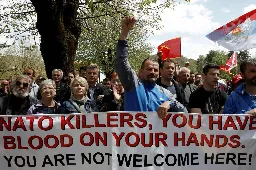
> To condemn some (the U.S.) for pursuing [neo]imperialist plans and being hypocrites and, at the same time, condemn others (Russia and China) for being dictators and violators of human rights is a Solomonic attitude that does not address the problem that the world faces today and, in the face of which, the revolutionary left must take sides. > >The U.S. and its allies are (always) on the offensive to constrain, undermine and, if possible, break up (politically and territorially) Russia and China. And the latter respond as they can to defend themselves from this siege. The former attack; the latter defend themselves from aggression. > >Without making this distinction, nothing becomes clear; and the revolutionary left is unable to play a role in events, bypassing reality.
-
The Russian Federation: a target, not a superpower
www.workers.org Capitalist Russia: a target, not a superpowerThis article, originally published July 12, 2017, by Workers World, remains timely in January 2022 as the U.S. threatens war at the Russian border with Ukraine and ramps up China-baiting in an attempt to break up agreements being forged between nations seeking to remain independent of U.S. imperiali
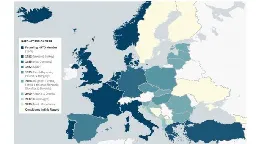
> Russia is a target of U.S. [neo]imperialism because of its vast resources. Eighty percent of Russian exports abroad are now in raw materials, primarily gas and oil. The petroleum industry in Russia is one of the largest in the world. It is the largest exporter of natural gas. Coal, iron, aluminum, precious metals, lumber and cereals are other major exports. > > This makes Russia’s economy especially vulnerable to global commodity swings and drastic downturns. > > There is an insatiable drive to control Russia’s great wealth by the largest banks and corporations. All currents of the U.S. and Western [neo]imperialist ruling class are desperate to have unlimited access to this great stream of profits, which they had finally laid their hands on just a few years ago. Remember: Imperialism’s very survival depends on expansion and profit.
-
COVID-19 and the prison abolition movement: A Workers World commentary
www.workers.org COVID-19 and the prison abolition movementThe current spike in COVID-19 infections among the incarcerated in prisons, jails and detention centers is not only alarming and life-threatening to tens of thousands of people, it is an urgent challenge for the prison abolition and prisoners’ advocacy movement. We must build a movement from Califor
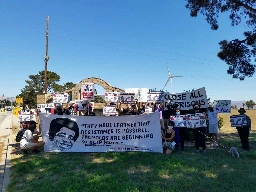
>The U.S. Commission on Civil Rights just released its latest report, “The Civil Rights Implications of Cash Bail,” revealing the true nature of the incarceration system in this country. Between the years 1970 and 2015, there was a 433% increase in the number of people who were incarcerated pretrial. The number of people languishing in prisons and jails who haven’t even been convicted of any crime is growing exponentially. (U.S. Commission on Civil Rights, Jan. 20) > >In fact, pretrial detention is a guaranteed racist institution with Black and Latinx detainees receiving more severe conditions of release. And according to this report, more than 60% of the pretrial incarcerated population (in court they are called “defendants”) are there in places like Rikers Island or Santa Rita Jail because they can’t afford bail! In many states, these pretrial defendants are placed in state prisons while awaiting trial. In fact, more than 5 million people are sitting in jail or prison awaiting trial. > >And what about our incarcerated siblings who have already been sentenced? In a racist, sexist, transphobic legal system, how can most of the incarcerated population ever get a fair trial? Organizations like RAPP, Release Aging People in Prison, have been working tirelessly to get elderly and immunocompromised prisoners released in New York State and around the country. “If the risk is low, let them go!” is their motto. And for most people inside, the risk is more than low — after decades inside it is time to release them all!
- www.workers.org Solution to global inequality is socialism!
Around the globe, billions of people are suffering incredible losses resulting from capitalism’s inability and refusal to seriously address the COVID-19 pandemic. Millions have lost lives or loved ones. Families are houseless. Workers have been forced to choose between risking their health ...

-
U.S. hands off Ukraine–a Workers World editorial
www.workers.org U.S. hands off UkraineBy ordering preparations to send 5,000 more U.S. troops to countries near the Russian border Jan. 23, President Joe Biden stepped up the risk of a war between the world’s two most powerful nuclear-armed states. Once again, U.S. imperialism has threatened a new military adventure in pursuit of domina
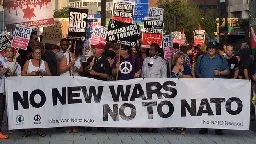
> Workers World demands U.S. hands off Ukraine, withdraw U.S. troops and weapons from Europe and put an end to the NATO alliance.
-
Why Trotskyism is the Light Shining the Path of Socialist Revolution
From their Facebook page:
> The history of the last 100 years – that is since the 1921 Soviet victory in the Russian Civil War that consolidated the October 1917 Socialist Revolution – is a history of blown opportunities for workers revolution. Sure, some very important victories were achieved in this period in the so-called “Third World” – that is the anti-capitalist revolutions in North Korea, China, Cuba, Vietnam and Laos. However, at the same time, the world’s first workers state (the Soviet Union) was destroyed in capitalist counterrevolution in 1991-92 and so were the East European ones created in the wake of the Soviet Red Army’s heroic triumph in World War II. Moreover, countless opportunities for revolution were not taken or betrayed over these last 100 years – mainly as a result of the re-badged Menshevik strategy of the “Popular Front”. It is as if there has been a soccer match between two sides where one side – the working class – has all the opportunities to score and the other side – the capitalist exploiters – has very few … but the score still ends up being a draw! We therefore insist on Trotskyism as the perspective needed to ensure that the working class seizes all the goal scoring opportunities that history inevitably creates for it. > >Trotskyism is merely the program of authentic Leninism - that is genuine Bolshevism. It is only necessary to speak of Trotskyism because the program of Leninism was perverted by the rightward moving post-1924 Soviet leadership. > >The following article deals with what authentic Trotskyism advocates. This is crucial because especially since it is now 98 years since the split between the Trotskyist Left Opposition and the post-Lenin leadership of the Soviet Union, the reasons for this split are often obscured in myths, conspiracy theories and disputes about who said and did what back then. The real political issues and disputes are often muddied. > >This article also deals with the important question of why and how the Trotskyist Fourth International degenerated, just like the Communist International (Comintern) a few decades earlier. It makes the point that in the end, all Marxist groups are subjected to the same pressures regardless of the particular political tradition that they claim to stand on. Moreover, ever since most of the nominal “Trotskyists” despicably took the side of imperialism in the 1980s Cold War II, it is no longer true that people that call themselves “Trotskyists” are necessarily closer to authentic Bolshevism and thus authentic “Trotskyism” than those that consider themselves anti-Trotskyist, “Marxist-Leninists”. Therefore, any socialist workers group must be judged mainly by their actual actions and political positions and not mainly by the particular “ism” (whether that be Trotskyism or Stalinism or Maoism or anarchism or some other “ism”) that they claim to stand by. Or in other words, the proof of the pudding is in the eating and not in the recipe. However, while the proof of the pudding is in the eating, the recipe is still important. It is true that just like how a cook who can bake a good pudding with a bad recipe has great cooking instincts, a socialist who can arrive at the correct positions despite a flawed political theory has good revolutionary class instincts. But sooner or later, the cook with the bad recipe, perhaps when tired, will get the pudding wrong. Similarly, flawed political principles based on a flawed political tradition will eventually lead to flawed political positions. Meanwhile, just like how having the recipe right allows the cook to teach others to cook well, a correct political theory allows a Marxist to train others in revolutionary politics. That is after all the most crucial task of communist activists – to spread communist consciousness. That is why the principles of authentic Trotskyism need to be explained and propagated. This article, which we have put a huge amount of effort into, attempts to do this. Please have a read.
-
Leon Trotsky's Theory of the Degenerated Workers State Explained
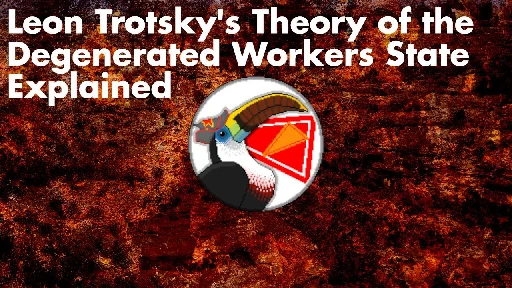
YouTube Video
Click to view this content.
-
Did Lenin think the Soviet Union was State Capitalist?
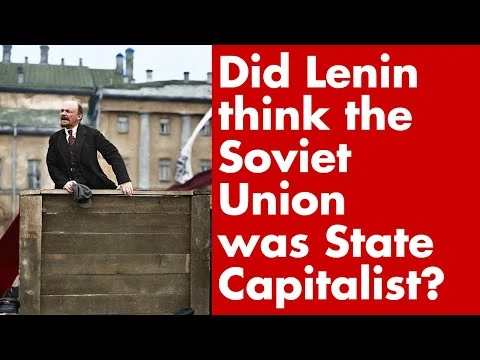
YouTube Video
Click to view this content.
-
No, Stalin did not adopt or take Trotsky's Economic Plan
Copying this post a user submitted on reddit.
Comrades I am sure you have seen this claim "Stalin adopted the Left Oppositions Super Industrialization plan" or something similar it shows up in Animal Farm, to more "serious" critiques from Left Communists and Anarchists. So I want to debunk this claim because i am tired of hearing it, but it unfortunately permeates a lot of western histories of the events.
The History
Let us start with a good primary source on this from a political opponent of both Trotsky and Stalin, Ryutin.
Ryutin was certainly on the party right, he was very against Collectivization and for very slow Industrialization. It is also worth noting this was written in 1932 and the fullest extent of Stalin's push to industrialize and forced collectivization were still being carried out.
"Having robbed the thread of Trotsky and his group, Stalin affirms that his super industrialisation pressure is not only on the kulaks but also on the middle peasantry; extraordinary tax, extortion of one and a half milliard roubles from the cooperatives and in the future an increase in prices,—cards, queues—all theses are something quite other than suggestions of the Trotskyists.
Stalin, of course, led the economic platform of Trotsky to the limit of the absurd, to the logical end, but this was not accidental : “in for a penny, in for a pound”."
So he compares it to robbing a thread, or taking it to the very extreme. Now Ryutin felt there was similarities and without a doubt the Left Opposition was for Industrialization and Collectivization, and Stalin did implement these, but to such an extreme. The Left Opposition was for Voluntary Collectivization, and not industrialization at the pace Stalin called for, as well as they were not for the targeting of all peasants.
So as far as opinions from histories I want to start with Stephen F. Cohen Stalinism and Bolshevism an article from Robert C. Tucker's Stalinism: Essays in Historical Interpretation
"Trotsky and the Left opposition are said to have been anti-NEP and embryonically Stalinist, the progenitors of "almost every major item in the political program that Stalin later carried out." Stalin is then having said to have stolen, or adapted, Trotsky's economic policies in 1929. Having portrayed a "basic affinity between Trotsky's plans and Stalin's actions," these secondary interpretations suggest at least a significant continuity between Stalinism and Bolshevik thinking in 1920's, and underlie the general interpretation of NEP. They are, however, factually incorrect."
"Even Preobrazhesnky, the avatar of "super-industralization" who's fearful arguments about the necessity of "primitive socialist accumulation" based on "exploiting" the peasant sector are often cited as Stalin's inspiration, accepted the hallmark of NEP economics. He wanted to "exploit" peasant agriculture through market relations by artificially fixing state industrial prices higher then agricultural prices. Both he and Trotsky, and the Bolshevik Left generally, thought in terms of peasant farming for the foreseeable future. However inconsistent their ideas may have been, neither ever advocated imposed collectivization, much less wholesale collectivization as a system of requisitioning or a solution to industrial backwardness"
"Trotsky's actual economic proposals in the 1920s were based on the NEP and its continuation. He urged greater attention to heavy industry and planning earlier than did Bukharin, and he worried more about the village "kulak"; but his remedies were moderate, market-orientated, or, as the expression went, "nepist." Like Bukharin, he was a "reformist" in economic policy, looking towards the evolution of NEP Russia towards industrialism and socialism. "
From Stephen F. Cohen's Bukharin and the Bolshevik Revolution a Political Biography.
"The turbulent months between April 1929 when Bukharin was defeated and December were among the most important in Russian history. They brought three large, related events: an abrupt radicalization of Stalin's policies, accompanied by his emerging practice of making major decisions autocratically; a further worsening of the state's relations with the peasantry; and the onset of a furious official campaign against the Right opposition and Bukharin personally, which grew into a repudiation of political moderation generally. Together these developments led to policies unlike anything ever advocated by any Bolshevik group, including the Left, to the final destruction of NEP, and to the coming of Stalin's "revolution from above." p.329
Now from Moshe Lewin's Political Undercurrents in Soviet Economic Debates
"In propaganda texts, the majority's spokesmen accused the Left of planning to liquidate the NEP, to oppress the peasantry, to raise prices and lower the standard of living, and other sins. But the latter, no doubt sincerely, reasserted that it favored the NEP, did not intend to expropriate the property of the kulaks, nor indeed, that of any other private entrepreneurs, and that it, in fact even, welcomed some growth of these elements provided the growth of the socialist sector, mainly industrial, was constantly assured. They opposed using the G.P.U. against the private sectors.p.35
From the same text we can take a look at historical opinions too to back this up.
“Trotsky, too in a brochure written in August 1925 developed positive expectations about long-term prospects of the NEP and defined it as “cooperation and competition” between socialism and capitalism. “ Preobrazhensky originally an opponent of the NEP in 1921 supported it and its transitional character and was against any violent elimination of it or forced collectivization."
Again from Moshe LEwin's Poltical Undercurrents in Soviet Economic Debates.
"Trotsky could afford to endorse the NEP wholeheartedly because he too had some previous positions to call back on. He was , in fact, the first to have advocated NEP-like changes as early as Februrary 1920, but his proposals were then rejected by the Central committee. Trotsky then turned to his plan of etatization of the trade unions, but this too was rejected by Lenin, who was soon to adopt the NEP (on this both leaders agreed). For Trotsky's propsals of a new policy towards peasants"
Conclusion
Given Trotsky was one of the first to propose NEP like changes, and continued to defend it. How could one say that Stalin stole his economic position when Stalin got rid of the NEP. This is a very big difference in economic positions. Trotsky nor the LO ever advocated for forced collectivization, or getting rid of the NEP. Stalin's position originates with him, not Trotsky, not the Left Opposition and certainly not Bukharin.
-
Trotsky's Permanent Revolution
“The Perspective of permanent revolution may be summarized in the following way: the complete victory of the democratic revolution in Russia is conceivable only in the form of the dictatorship of the proletariat, leaning on the peasantry. The dictatorship of the proletariat, which would inevitably place on the order of the day not only democratic but socialistic tasks as well, would at the same time give a powerful impetus to the international socialist revolution. Only the victory of the proletariat in the West could protect Russia from bourgeois restoration and assure it the possibility of rounding out the establishment of socialism.
The background of this development deals with the special conditions of Russia's development. If you want some background on it you can read about it in Trotsky's 1905, and Lenin's
https://www.marxists.org/archive/trotsky/1907/1905/
Part of Trotsky's inspiration is when he read Lenin's book on the economic development of Russia in prison https://www.marxists.org/archive/lenin/works/1899/devel/index.htm
Trotsky's History of the Russian Revolution also contains an explanation of this. https://www.marxists.org/archive/trotsky/1930/hrr/ch01.htm
A big debate within Russian Social Democracy at this time was if the coming revolution would be a bourgeois revolution and establish capitalist development to grow the conditions of proletarian revolution, where Trotsky and some others at this time felt due to the way Russia development made bourgeois capitalist development impossible, and the coming revolution would be a proletariat one. That the Russian Capitalists would be unable to answer the land question, and a workers revolution leading the peasants would happen. We can see from the historical events this is how the things played out in Russia.
Permanent Revolution is also painted as an "opposition" to socialism in one country, or a counter theory. It is not and it predates even the Russian Revolution. It is based around the idea that not all countries will follow the same path of western Europe, an idea that Marx admitted that wouldn't be true in letters, though he never explored the idea in depth.
So I would highly encourage you to maybe consider giving Results and Prospects, and The Permanent Revolution a read. A lot of false ideas get spread about it, so maybe rather then listening to the slanders you can read what the idea says its self.
I am going to end with the main parts that Trotsky ends the book with.
"The theory of the permanent revolution now demands the greatest attention from every Marxist, for the course of the class and ideological struggle has fully and finally raised this question from the realm of reminiscences over old differences of opinion among Russian Marxists, and converted it into a question of the character, the inner connexions and methods of the international revolution in general.
With regard to countries with a belated bourgeois development, especially the colonial and semi-colonial countries, the theory of the permanent revolution signifies that the complete and genuine solution of their tasks of achieving democracy and national emancipation is conceivable only through the dictatorship of the proletariat as the leader of the subjugated nation, above all of its peasant masses.
Not only the agrarian, but also the national question assigns to the peasantry – the overwhelming majority of the population in backward countries – an exceptional place in the democratic revolution. Without an alliance of the proletariat with the peasantry the tasks of the democratic revolution cannot be solved, nor even seriously posed. But the alliance of these two classes can be realized in no other way than through an irreconcilable struggle against the influence of the national-liberal bourgeoisie.
No matter what the first episodic stages of the revolution may be in the individual countries, the realization of the revolutionary alliance between the proletariat and the peasantry is conceivable only under the political leadership of the proletariat vanguard, organized in the Communist Party. This in turn means that the victory of the democratic revolution is conceivable only through the dictatorship of the proletariat which bases itself upon the alliance with the peasantry and solves first of all the tasks of the democratic revolution.
Assessed historically, the old slogan of Bolshevism – ’the democratic dictatorship of the proletariat and peasantry’ – expressed precisely the above-characterized relationship of the proletariat, the peasantry and the liberal bourgeoisie. This has been confirmed by the experience of October. But Lenin’s old formula did not settle in advance the problem of what the reciprocal relations would be between the proletariat and the peasantry within the revolutionary bloc. In other words, the formula deliberately retained a certain algebraic quality, which had to make way for more precise arithmetical quantities in the process of historical experience. However, the latter showed, and under circumstances that exclude any kind of misinterpretation, that no matter how great the revolutionary role of the peasantry may be, it nevertheless cannot be an independent role and even less a leading one. The peasant follows either the worker or the bourgeois. This means that the ‘democratic dictatorship of the proletariat and peasantry’ is only conceivable as a dictatorship of the proletariat that leads the peasant masses behind it.
A democratic dictatorship of the prolelariat and peasantry, as a regime that is distinguished from the dictatorship of the proletariat by its class content, might be realized only in a case where an independent revolutionary party could be constituted, expressing the interests of the peasants and in general of petty bourgeois democracy – a party capable of conquering power with this or that degree of aid from the proletariat, and of determining its revolutionary programme. As all modern history attests – especially the Russian experience of the last twenty-five years – an insurmountable obstacle on the road to the creation of a peasants’ party is the petty-bourgeoisie’s lack of economic and political independence and its deep internal differentiation. By reason of this the upper sections of the petty-bourgeoisie (of the peasantry) go along with the big bourgeoisie in all decisive cases, especially in war and in revolution; the lower sections go along with the proletariat; the intermediate section being thus compelled to choose between the two extreme poles. Between Kerenskyism and the Bolshevik power, between the Kuomintang and the dictatorship of the proletariat, there is not and cannot be any intermediate stage, that is, no democratic dictatorship of the workers and peasants.
The Comintern’ s endeavour to foist upon the Eastern countries the slogan of the democratic dictatorship of the proletariat and peasantry, finally and long ago exhausted by history, can have only a reactionary effect. lnsofar as this slogan is counterposed to the slogan of the dictatorship of the proletariat, it contributes politically to the dissolution of the proletariat in the petty-bourgeois masses and thus creates the most favourable conditions for the hegemony of the national bourgeoisie and consequently for the collapse of the democratic revolution. The introduction of the slogan into the programme of the Comintern is a direct betrayal of Marxism and of the October tradition of Bolshevism.
The dictatorship of the proletariat which has risen to power as the leader of the democratic revolution is inevitably and, very quickly confronted with tasks, the fulfillment of which is bound up with deep inroads into the rights of bourgeois property. The democratic revolution grows over directly into the socialist revolution and thereby becomes a permanent revolution."
-
The NEP and Leon Trotsky
The New Economic Policy as a fundamental shift in the economic relations to the young Soviet Republic. I want to go over Trotsky’s relationship with this policy as it seems to be a commonly misunderstood aspect of Trotsky.
War Communism
Before there was the NEP, there was War Communism was lasting from 1918-1921. The winter of 1917-1918 saw huge food shortages bread rations in the capital fell to 50grams of bread per day. When the revolution happened the peasants began to seize land even without authorization, the policy that did come down was more of legalization of what was already happening in the country. This combined with the unauthorized nationalization of factories created a lot of economic turmoil. Prices were set by the government and the peasants were supposed to sell at those prices this was the policy of the Tsarist, the Provisional and the early Bolshevik government. However, by 1917 prices had fallen behind what the peasants wanted and what they need to be able to purchase goods. This was all a problem before the civil war set in, and the loss of Ukraine and other grain-producing areas created a huge crisis. In Petrograd over half of the workers were unemployed, The population of the capital was 2.5 million in 1917 and was below 1.5 million in 1918, other major cities of European Russia lost large portions of their population as well.
This motivated a number of shifts in policy which constitutes “war communism” while most of these methods were necessary actions by the situation many people ended up turning them into virtues. A major aspect of this policy shift was moving to grain requisitions, these required armed detachments be sent out to take grain, most of this was launched from the poorest peasants being told to seize the grain stores of the wealthy peasants. This policy did see a large increase in the amount of grain being taken in from 30 million poods to 110 million poods in 1918. During this period it remained wholly impossible to live off the rations despite the increase. Everyone relied on illegal grain trade to some extent. This resulted in some legalization of the illegal trade, though a meshochniki became legalized to some extent and were permitted to trade in a certain amount of grain 1.5 poods worth. This period as well saw some parts of the country saw families no longer pay for food, housing, postage, and transportation. All of this gave hope that there could be a quick transition to a money less society. In 1919 the party programme read
“To continue undeviatingly to replace trade by planned, governmental organized distributions of products, The aim is to organize the whole population into producers’ and consumers' communes … [The Party] will strive for the most rapid carrying out of the most radical measures preparing the abolition of money. “
While there remained much hope the numbers paint a very bleak picture of the situation of the industry in the young Soviet Republic
Here we have a comparison between 1913 and 1920
https://imgur.com/a/f0lNNQj
Production, on the whole, remained far behind pre-war, of course, the problems came with having a civil war and the loss of some territory, but as well the emergency measures that constituted war communism were becoming not sustainable and production was not recovering. The peasants wanted some security and the requisitions to end, the state at this time was fully incapable of planning all of the industry at this time.
Ending War Communism
While most of the party was still fully in support of War Communism there started to be some push back. Trotsky in the winter of 1919-1920 was in the Urals direction economic work, mostly focusing on transportation inability to transport things at that point became a major stalling factor in getting people food and other resources. Trotsky wrote a letter in February 1920 he proposed replacing requisitions with a tax in kind. It was to be set up in a way to reward peasants for increasing production and to free them from the requisitions, to increase the ability to engage in trade for the peasants. Trotsky’s proposal was defeated 4 to 15 with Lenin being opposed. In Alec Nove’s An Economic History of the USSR he also reports that Yuri Larin proposed something similar near the end of January which was also opposed. Trotsky’s proposal is detailed at the start of chapter 19 of Volume II of Carr’s The Bolshevik Revolution.
The implementation of the NEP
February 8th, 1921 continued the discussion in the Politburo prompted Lenin to draft a new Policy.
To satisfy the desire of the non-party peasantry for the replacement of the requestion (meaning the taking of surpluses) by a grain tax ; To reduce the level of this tax in comparison with last year’s requisition ; To approve the principle of bringing the level of tax into relation with the effort of the cultivator in the sense of lowering the percentage of tax in proportion to an increase of effort by the cultivator. To extend the freedom of the cultivator to use his surplus over and above the tax for local economic exchange, on condition of prompt and full payment of the tax.
February 24th saw Lenin’s draft notes turned into policy and submitted to the central committee. Lenin introduced this at the 10th party congress.
March 21st saw this become government policy
So contrary to some ideas Trotsky was not opposed to the NEP, in fact, his proposal is pretty similar to what become Lenin’s notes. So much for the idea of Trotsky being opposed to the NEP
Left Opposition
As well as during the era of the economic debates of the 1920s Trotsky had this to say in 1925 according to Moshe Lewin’s Political Undercurrents in Soviet Economic Debates.
“Trotsky, too in a brochure written in August 1925 developed positive expectations about long-term prospects of the NEP and defined it as “cooperation and competition” between socialism and capitalism. “ Preobrazhensky originally an opponent of the NEP in 1921 supported it and its transitional character and was against any violent elimination of it or forced collectivization.
Conclusion
So contrary to the often-repeated myth not only did Trotsky not oppose the NEP he was one of the first Bolsheviks to make proposals to move to it.